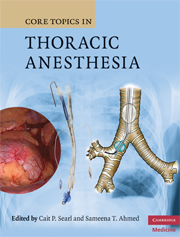Book contents
- Core Topics in Thoracic Anesthesia
- Core Topics in Thoracic Anesthesia
- Copyright page
- Dedication
- Contents
- Contributors
- Preface
- Abbreviations
- Section 1 Pre-operative considerations
- Section 2 Anesthesia for operative procedures
- Section 3 Post-operative management
- Chapter 23 Peri-operative intravenous fluid management
- Chapter 24 General post-operative management
- Chapter 25 Management of post-operative respiratory problems
- Chapter 26 Extracorporeal membrane oxygenation (ECMO) and related technologies
- Chapter 27 Management of bronchopleural fistula
- Chapter 28 Pain management after thoracotomy
- Chapter 29 Chronic pain after thoracic surgery
- Chapter 30 Arrhythmias after thoracic surgery
- Index
Chapter 26 - Extracorporeal membrane oxygenation (ECMO) and related technologies
from Section 3 - Post-operative management
Published online by Cambridge University Press: 10 December 2009
- Core Topics in Thoracic Anesthesia
- Core Topics in Thoracic Anesthesia
- Copyright page
- Dedication
- Contents
- Contributors
- Preface
- Abbreviations
- Section 1 Pre-operative considerations
- Section 2 Anesthesia for operative procedures
- Section 3 Post-operative management
- Chapter 23 Peri-operative intravenous fluid management
- Chapter 24 General post-operative management
- Chapter 25 Management of post-operative respiratory problems
- Chapter 26 Extracorporeal membrane oxygenation (ECMO) and related technologies
- Chapter 27 Management of bronchopleural fistula
- Chapter 28 Pain management after thoracotomy
- Chapter 29 Chronic pain after thoracic surgery
- Chapter 30 Arrhythmias after thoracic surgery
- Index
Summary
Keywords
- Type
- Chapter
- Information
- Core Topics in Thoracic Anesthesia , pp. 177 - 185Publisher: Cambridge University PressPrint publication year: 2009



